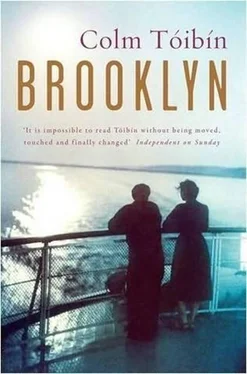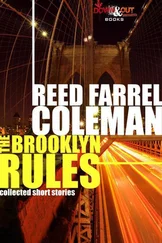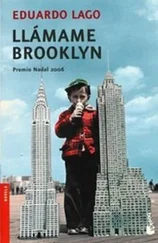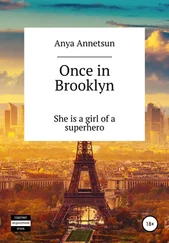"Because I like Irish girls."
"Would any one do?"
"No, I like you."
"Yes, but if I wasn't there? Would you just pick another?"
"No, if you weren't there, I would walk home all sad looking at the ground."
She explained to him then that she had been homesick, and that Father Flood had inscribed her on the course as a way of making her busy, and how studying in the evening made her feel happy, or as happy as she had been since she had left home.
"Don't I make you feel happy?" He looked at her seriously.
"Yes, you do," she replied.
Before he could ask her any more questions that might, she thought, lead her to say that she did not know him well enough to make any further declarations about him, she told him about her classes, about the other students, about bookkeeping and keeping accounts and about the law lecturer Mr. Rosenblum. He knitted his brow and seemed worried when she told him how difficult and complicated the lectures were. Then when she recounted what the bookseller had said on the day when she went to Manhattan to buy law books, he became completely silent. When their coffee came he still did not speak but kept stirring the sugar, nodding his head sadly. She had not seen him like this before and found that she was looking closely at his face in this light, wondering how quickly he would return to his usual self and begin smiling and laughing again. But, when he asked the waiter for the bill, he remained grave and he did not speak as they left the restaurant.
Later, when the dance music became slow and they were dancing close to each other, she looked up and caught his gaze. He had the same serious expression on his face, which made him appear less clownish and boyish than before. Even when he smiled at her, he did not make it seem like a joke, or a way of having fun. It was a warm smile, sincere, and it suggested to her that he was stable, almost mature and that, whatever was happening now, he meant business. She smiled back at him but then looked down and closed her eyes. She was frightened.
He arranged that evening that he would collect her the following Thursday from college and walk her home. Nothing more, he promised. He did not want to disturb her, he said, from her studies. The following week, when he asked her to come to a movie with him on the Saturday, she agreed because all of her fellow lodgers, with the exception of Dolores, and some of the girls at work were going to go to Singin' in the Rain, which was opening. Even Mrs. Kehoe said that she intended to see the film with two of her friends and thus it became a subject of much discussion at the kitchen table.
Soon, then, a pattern developed. Every Thursday, Tony stood outside the college, or discreetly inside the hall if it were raining, and he accompanied her onto the trolley-car and then he walked her home. He was invariably cheerful, with news of the people he had worked for since he had seen her last, and the different tones they used, depending on their age or their country of origin, as they explained the problems they had with the plumbing. Some of them were, he said, so grateful for the service that they tipped him handsomely, often giving him too much; others, even those who had blocked their own drains with garbage, wanted to argue about the bill. All the managers of buildings in Brooklyn, he said, were mean, and when Italian managers discovered he was Italian too, they were even meaner. The Irish ones, he was sorry to tell her, were mean and stingy no matter what.
"They are real mean. They're stingy as hell, those Irish," he said, and grinned at her.
Each Saturday he took her to a movie; they often travelled on the subway into Manhattan to see something that had just opened. On the first such date, when they joined the queue for Singin' in the Rain, she discovered that she was dreading the moment when the cinema became dark and the film began. She liked dancing with Tony, how gradually they moved close to each other in the slow dances, and she liked walking home with him, how they waited until they were near Mrs. Kehoe's house but not too near, before he kissed her. And how he never, even once, made her feel that she should pull his hand away or draw back from him. Now, however, at their first film together, she believed that something would have to change between them. She was almost tempted to mention it as they stood in the queue, to avoid any unpleasantness inside in the dark. She wanted to say to him, as nonchalantly as she could, that she would prefer actually to see the film rather then spend two hours necking and kissing in the cinema.
Inside, having bought the tickets, he bought popcorn as well, and did not, to her surprise, usher her to the back seat of the cinema, but asked her where she wanted to sit and seemed happy to sit in the middle, where they would have the best view. Although he put his arm around her during the film and whispered to her a few times, he did nothing more. As they waited for the subway afterwards, he was in such good humour and had loved the film so much that she felt an immense tenderness for him and wondered if she would ever see a side of him that was disagreeable. Soon, as they went more regularly to movies, she saw that a sad film or a film with disturbing scenes could leave him silent and brooding afterwards, locked into some depressed dream of his own that it would take time to lift him out of. So too, if she told him anything that was sad, his face would change and he would stop making jokes and he would want to go over what she had told him. He was not like anyone else she had ever met.
She wrote to Rose about him, sending the letter to the office, but did not mention him in letters to her mother or to her brothers. She tried to describe him to Rose, how considerate he was. She added that because she was studying she did not have time to see him with his friends, or visit his family, even though he had invited her home for a meal with his parents and his brothers.
When Rose replied to her, she asked what he did for a living. Eilis had deliberately left this out of the letter because she knew that Rose would hope that she would go out with someone who had an office job, who worked in a bank or an insurance office. When she wrote back, she buried the information that he was a plumber in the middle of a paragraph, but she was aware that Rose would notice it and seize on it.
One Friday night soon afterwards, as they were coming into the dance together, both of them in good humour as the fierce cold had briefly lifted and Tony had talked about summer and how they might go to Coney Island, they were met by Father Flood, who seemed cheerful too. But there was something odd, Eilis thought, about the length of time he spoke to them and his insisting that they have a soda with him, which made her believe that Rose had written to Father Flood and that he was there to see what Tony was like for her.
Eilis was almost proud of Tony's casual good manners, of his easy way of responding to the priest, all of it underlined by a way of being respectful, of letting the priest talk, and not saying a single word out of place. Rose, she knew, would have an idea in her head of what a plumber looked like and how he spoke. She would imagine him to be somewhat rough and awkward and use bad grammar. Eilis decided that she would write to her to say that he was not like that and that in Brooklyn it was not always as easy to guess someone's character by their job as it was in Enniscorthy.
She watched now while Tony and Father Flood spoke about baseball and Tony forgot that he was talking to a priest as he became feverish in his enthusiasm for what he was saying and thus interrupted Father Flood in a mixture of amused friendliness and passionate disagreement about a game they had both seen and a player Tony said he would never forgive. For a while they appeared not to realize that she was even there and when they finally noticed they agreed that they would take her to a baseball game as long as she pledged in advance that she was a Dodgers fan.
Читать дальше












